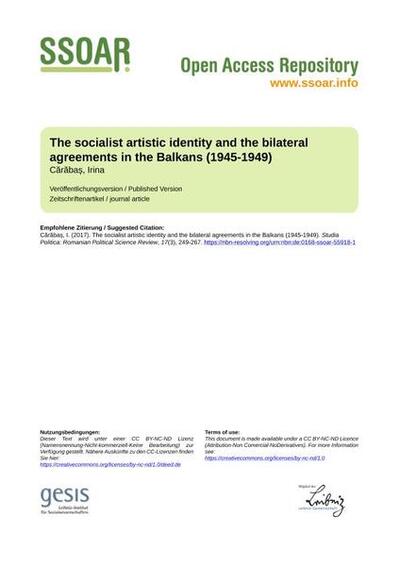Javascript must be enabled to continue!
The socialist artistic identity and the bilateral agreements in the Balkans (1945-1949)
View through Europeana Collections
After the Second World War, a new regional identity was configured through collaboration agreements not only between the USSR and each of the Eastern Bloc countries but, at the same time, through less hierarchical relationships between the newly installed communist regimes. These relationships also entailed cultural conventions, which stipulated joint events and exhibitions or documentary trips for artists. This article focuses on the artistic exchanges between Romania, Bulgaria and Yugoslavia in the early years of the postwar era giving special attention to the art institutions that were assigned to operate them. Such international relationships are revealing for the local negotiations concerning the relation between artists and the state, but also for the political prospects in the Balkans. Moreover, the early artistic exchanges set out a series of practices that were maintained throughout the entire socialist period and therefore contributed to charting a common artistic identity. Although the Soviet cultural model settled certain borders and modes of action in each country through imported art institutions or policies, the artistic exchanges within the Eastern Bloc had also an independent life, which sometimes even bypassed it. Furthermore, in each country, Socialist Realism was configured at the intersection of Soviet directives, local artistic hierarchies and practices, and bilateral exchanges.
Title: The socialist artistic identity and the bilateral agreements in the Balkans (1945-1949)
Description:
After the Second World War, a new regional identity was configured through collaboration agreements not only between the USSR and each of the Eastern Bloc countries but, at the same time, through less hierarchical relationships between the newly installed communist regimes.
These relationships also entailed cultural conventions, which stipulated joint events and exhibitions or documentary trips for artists.
This article focuses on the artistic exchanges between Romania, Bulgaria and Yugoslavia in the early years of the postwar era giving special attention to the art institutions that were assigned to operate them.
Such international relationships are revealing for the local negotiations concerning the relation between artists and the state, but also for the political prospects in the Balkans.
Moreover, the early artistic exchanges set out a series of practices that were maintained throughout the entire socialist period and therefore contributed to charting a common artistic identity.
Although the Soviet cultural model settled certain borders and modes of action in each country through imported art institutions or policies, the artistic exchanges within the Eastern Bloc had also an independent life, which sometimes even bypassed it.
Furthermore, in each country, Socialist Realism was configured at the intersection of Soviet directives, local artistic hierarchies and practices, and bilateral exchanges.
Related Results
“I Lived without Seeing These Art Works”: (Albanian) Socialist Realism and/against Contemporary Art
“I Lived without Seeing These Art Works”: (Albanian) Socialist Realism and/against Contemporary Art
Abstract
This article looks closely at the inclusion of Albanian Socialist Realism in one of renowned Swiss curator Harald Szeemann's last exhibitions, Blood & H...
US-Korea Oil Agreement, January 1949: Character and Significance
US-Korea Oil Agreement, January 1949: Character and Significance
In 1949, the Korean government signed six oil agreements. This article details the negotiation process of the Agreement between the Republic of Korea, the United States, and Korea ...
Efficacy of Ultrasound Guided Bilateral Erector Spinae Block in Attenuating Pneumoperitoneal Stretch Response in Patients Undergoing Laparoscopic Abdominal Surg
Efficacy of Ultrasound Guided Bilateral Erector Spinae Block in Attenuating Pneumoperitoneal Stretch Response in Patients Undergoing Laparoscopic Abdominal Surg
Background: Increase in heart rate and blood pressure in response to pneumoperitoneum produced during laparoscopic abdominal surgeries is a challenging situation to anesthesiologis...
Punk – but not as we know it: Punk in post-socialist space
Punk – but not as we know it: Punk in post-socialist space
In this introductory article, the rationale for considering punk in a particular spatial and temporal setting (post-socialist societies) is outlined. It is argued that such an ente...
Aboriginal rights to cultural property in Canada
Aboriginal rights to cultural property in Canada
This article explores the rights of Aboriginal peoples in Canada concerning movable Aboriginal cultural property. Although the Canadian constitution protects Aboriginal rights, the...
Korea-KOSCO Oil Agreement, September 1949
Korea-KOSCO Oil Agreement, September 1949
In September 1949, the Korean government signed a toal of four oil agreements with foreign oil companies. This article specifically analyzes one of those agreement, the Agreement B...
MEMOIRE DES BALKANS, MEMOIRES DES FRANCE(S) : VERS LA RECONNAISSANCE DE MEMOIRES PLURIELLES ET NON EXCLUSIVES
MEMOIRE DES BALKANS, MEMOIRES DES FRANCE(S) : VERS LA RECONNAISSANCE DE MEMOIRES PLURIELLES ET NON EXCLUSIVES
MEMORY OF THE BALKANS, MEMORIES OF FRANCE(ES): TOWARDS RECOGNITION OF MULTIPLE AND NON EXCLUSIVES MEMORIES
The contemporary approach to memorial memory in France is quite different...
Social aspects of the transition to farming in the Balkans
Social aspects of the transition to farming in the Balkans
The Neolithization of the Balkans could be considered as a very complex social phenomenon. In this work we study the causes for the cultural and social integration of hunter-gather...
Recent Results
Icon with the Virgin and Child, Byzantine Museum, Kastoria, Greece
Icon with the Virgin and Child, Byzantine Museum, Kastoria, Greece
Icon with the Virgin and Child, detail, originally from Agioi Anargyroi, Kastoria...
Callum Innes, Exposed Painting Byzantine Blue (2016)
Callum Innes, Exposed Painting Byzantine Blue (2016)
Oil on linen, 39 3/10 × 38 1/2 in...
Press and Information Office, Republic of Cyprus: Icon of Prophet Elijah (Code: elias)
Press and Information Office, Republic of Cyprus: Icon of Prophet Elijah (Code: elias)
Icon of Prophet Elijah (BMIAM.16) Provevance: Monastery of Saint John Lambadistes, Kalopanagiotis...




